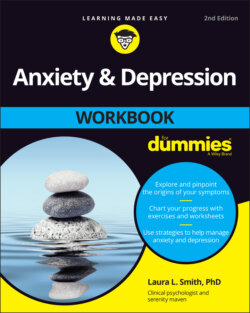Читать книгу Anxiety and Depression Workbook For Dummies - Laura L. Smith - Страница 18
Biological and Genetic Influences
ОглавлениеThe debate over nature versus nurture is complicated. Are you who you are primarily because of the genetic code you’ve inherited? Or did you emerge from the many interactions with people and places over the course of your life? Of course, the answer is both. Genes interact with experiences to produce the person you are today.
Nevertheless, genetic makeup does influence certain tendencies. Does your Uncle Paul seem down in the dumps? Was Cousin Jack a neat freak? Was your grandmother a recluse? What was your great-grandmother like? Why are these questions important? Because depression and anxiety tend to run in families. And genes could be responsible for a portion of your emotional distress.
If you have access to family members, ask if they’d be willing to talk with you about your family’s history. Ask them if any relatives, from either side of the family, suffered from symptoms of anxiety or depression. You may want to review the symptoms covered in Chapter 1 first. There’s no exact number of relatives required for determining if genetics are responsible for your symptoms. However, the more family members sharing similar problems, the more likely you’ve inherited a tendency for symptoms of depression or anxiety. Fill in the in blanks with notes about what you learn (Worksheet 2-1).
Worksheet 2-1 Possible Family Origins
| Members of my family with anxiety or depression (brothers, sisters, cousins, parents, uncles, aunts, and grandparents): |
Before you go blaming your grandmother for your anxiety, consider the possibility that anxiety was learned and passed on from generation to generation. For example, imagine your great-grandmother grew up in the Great Depression. She always worried about money and food. Her worries were real: She didn’t have enough money or food. She repeatedly told your grandmother that the world was unsafe. Your grandmother passed that tendency down to your mother, who also worried all the time. Now you, too, are a worrier. Is that trait genetic or learned? Probably both.
In addition to genetics, depression and anxiety can have biological underpinnings in the drugs you take (legal or illegal) or as the result of physical illness or injury. Drugs, whether over-the-counter, prescription, or illegal, have many side effects. Sometimes solving your problem is as simple as checking your medicine cabinet for possible culprits.
Almost any medication you’re taking can influence your emotions negatively. Check with your pharmacist or primary care physician to see if your medication may be causing part of your problem. Just don’t stop taking the medication without medical consultation.
In addition, alcohol is widely known to contribute to depression or anxiety when it’s abused. Some people find that even moderate amounts of alcohol exacerbate their problems with mood. Alcohol also interacts with a variety of prescribed and over-the-counter drugs to produce harmful and even deadly results.
Finally, illegal drugs such as cocaine, heroin, methamphetamine, ecstasy, and so on are sometimes taken to alter moods. In the short run, they accomplish that goal; but in the long run, they almost inevitably worsen mood problems.
Marijuana, legal in many states, has strong psychoactive qualities. Some people use marijuana to alleviate emotional distress and anecdotally report success. A few early studies suggest that for depressed and anxious people, cannabis may improve moods and decrease anxiety. However, empirical research studies have not been widely conducted to verify its usefulness for this purpose.
Physical illnesses or injuries (especially head trauma) can also produce symptoms of anxiety or depression. Not only can the illness itself cause mood problems, but worry and grief about illness or injury can contribute to your distress. If you’ve been diagnosed with a medical condition, check with your doctor to see if your depression or anxiety is related to that condition. Jot down any possible physical reasons for your anxiety or depression in Worksheet 2-2.
Worksheet 2-2 Physical Possibilities
